Media
The Nemedussa project aims to open up the field of nematology and increase knowledge of and interest in this fascinating and under-explored area of study. As nematodes have a serious impact on agriculture, their management should be addressed through education and capacity building initiatives. This project aims to increase awareness and education of nematodes ensuring that plant-parasitic nematodes are managed correctly and beneficial nematodes can be implemented as biocontrol organisms. Check back regularly for more media and publications from the Nemedussa project.
Video
The programme for the next PANEMA workshop is now available. This workshop, the 3rd offered by the Pan-African Nematology Network, is scheduled to take place in Cotonou, Benin from 12-13 March 2024. This event will include training for farmers and extension workers, the popular expert market, field visits to farms as well as scientific training for students. Participants will receive training in nematode management, identification and symptoms and related topics. This workshop takes a more targeted approach and was specifically designed for West-African students, farmers, extension workers and nematologists. It takes place within the context of agroecological transition in SSA.
Unlike the previous two workshops, this PANEMA workshop will be held completely in French, to better serve the participants. The programme is available in French and English.
In French:
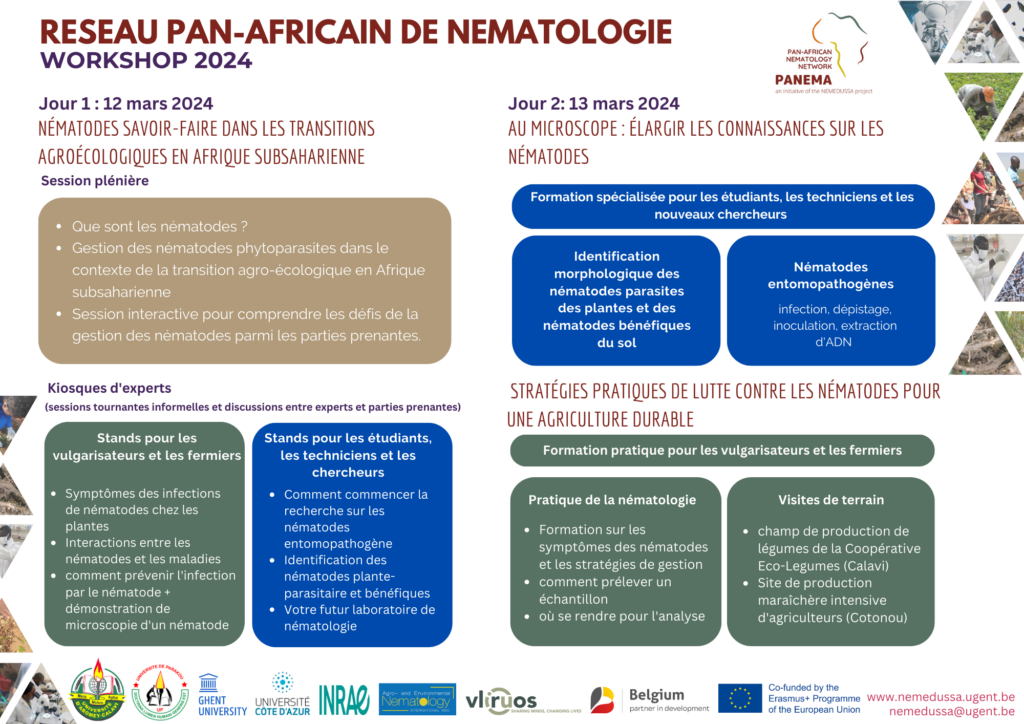
In English:
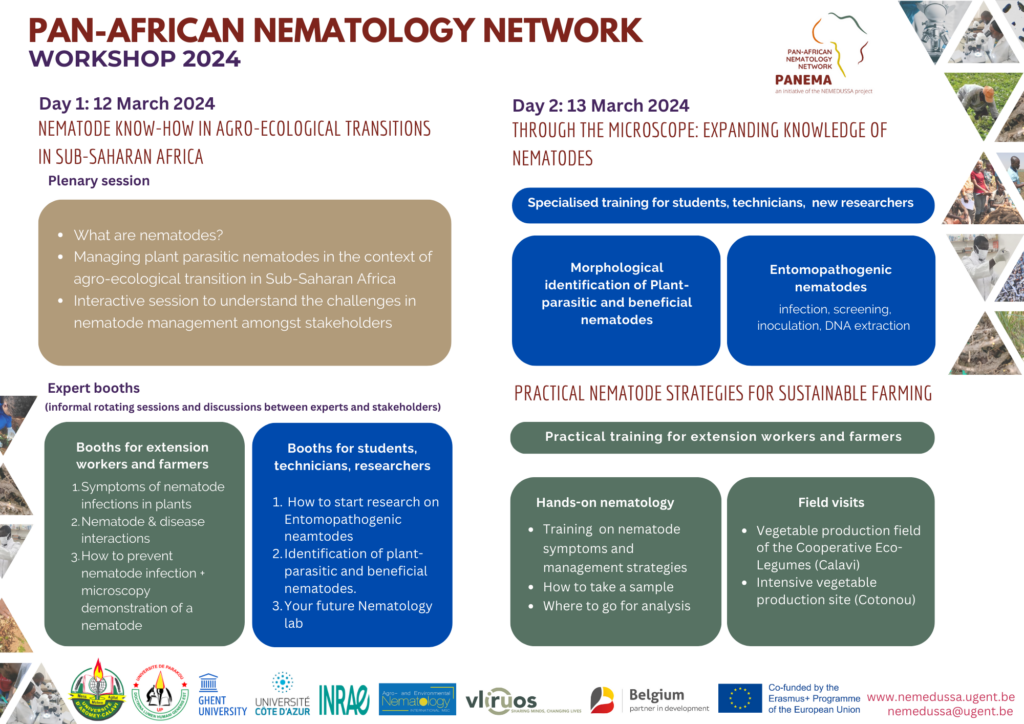
From 2-4 August 2022, a three-day training session on Field and Laboratory Techniques for Nematology was organized at Muni University, Uganda under the NEMEDUSSA Project. The training focused on plant-parasitic nematodes that cause losses in crops and created awareness to the stakeholders about the available nematology facilities and the capacity in the Department of Crop Science to conduct nematode diagnostics. The nematode laboratory of the Department of Crop Science was recently upgraded and received new microscopes and other material in the framework of the NEMEDUSSA project, with the generous sponsorship of EACEA. The participants in the training had the opportunity to use the material as part of their practical sessions.
The session was attended by 9 agricultural officers and instructors of agricultural colleges from the West Nile region. This group of participants were selected because they are practitioners and in direct contact with farmers and students. Their training was theoretical, as well as applied. The theory sessions included an introduction to nematodes by Dr. Alfred Alumai, as well as a focused session on Plant Parasitic Nematodes by Dr. Francis Onyilo. Practical sessions, lead by Ms. Betty Nyangwire, included field sample collection, nematode extraction techniques, microscopy, and morphological identification.
Participants agreed that the training on basic nematology was a successful one. During evaluation, the trainees pointed out a number of recommendations. Participants recommended the number of trainees in nematology be increased to benefit all West Nile districts if funds allow. Trainees are ready and willing to recommend their colleagues for the nematology training, as their fellow extension colleagues lack knowledge and skills in diagnostics and management.
At the completion of the training, many participants shared the desire to continue with nematology training at any level, e.g., short courses, MSc and PhD, and they felt this was an excellent introduction into the field.

Dr. Francis Onyilo giving explanation to Mr. Emmanuel Banya (University Secretary/Accounting Officer) during the tour and opening of the 3-day Training on Basic Nematology at Muni University. 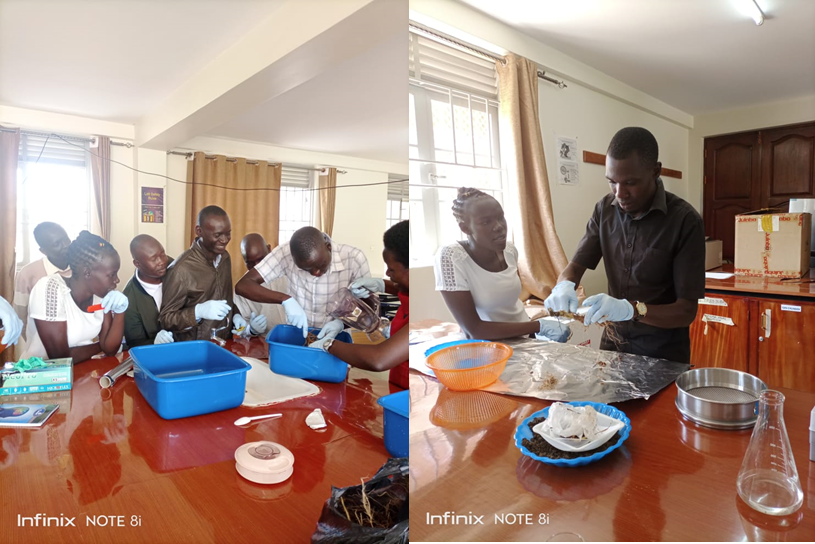
Trainees preparing soil and root samples for nematode extraction (Free-living and Root knot nematodes from tomato) in the Laboratory at Muni University 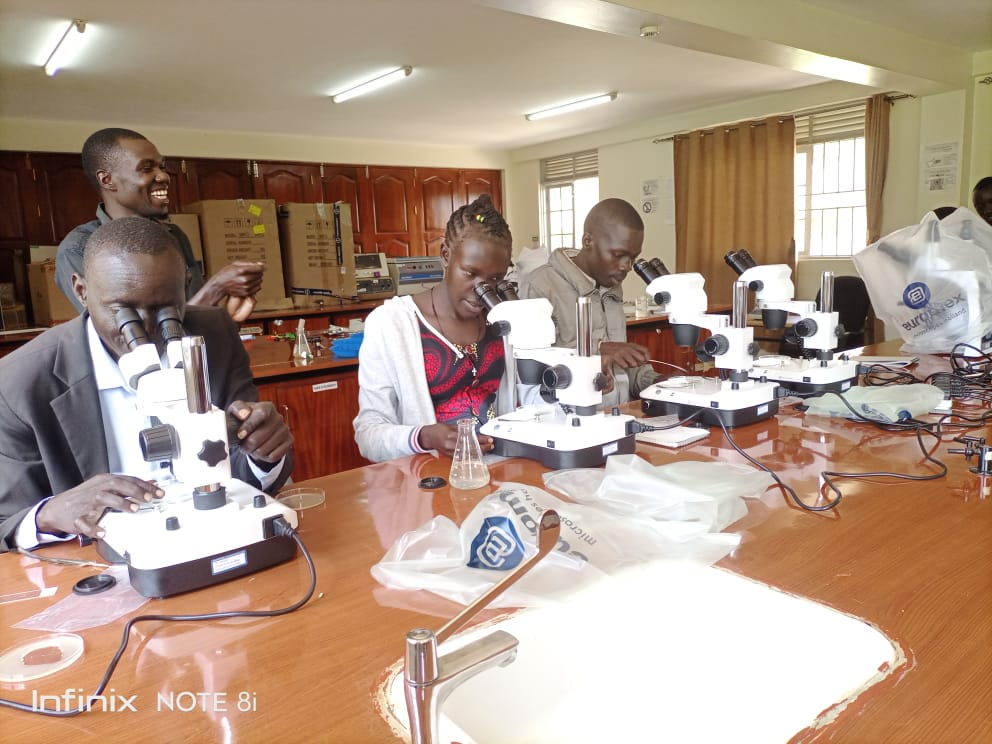
Trainees during microscopy class 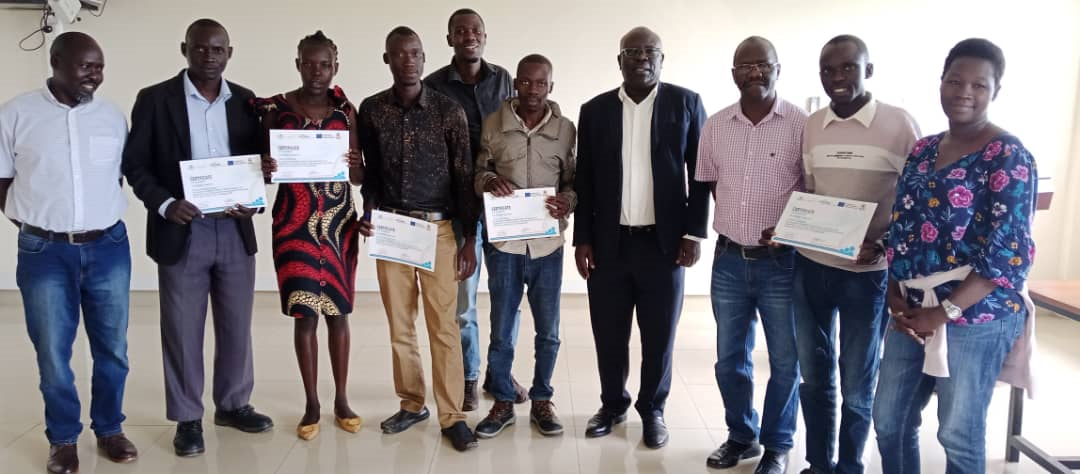
Group photo with the trainees at their award ceremony. From 4-8 July 2022, Stellenbosch University welcomed 15 participants to the short course on entomopathogenic nematology. Due to popular demand, this course, initially offered in January, was presented a second time to an interested audience. The specialised training drew participants from across South Africa and Africa, with participants from Kenya, Ethiopia as well as South African participants from private companies, Government, the Agriculture Research Council and other universities.
The EPN course was organised though the SU by Caro Kapp with the support of the NEMEDUSSA project.
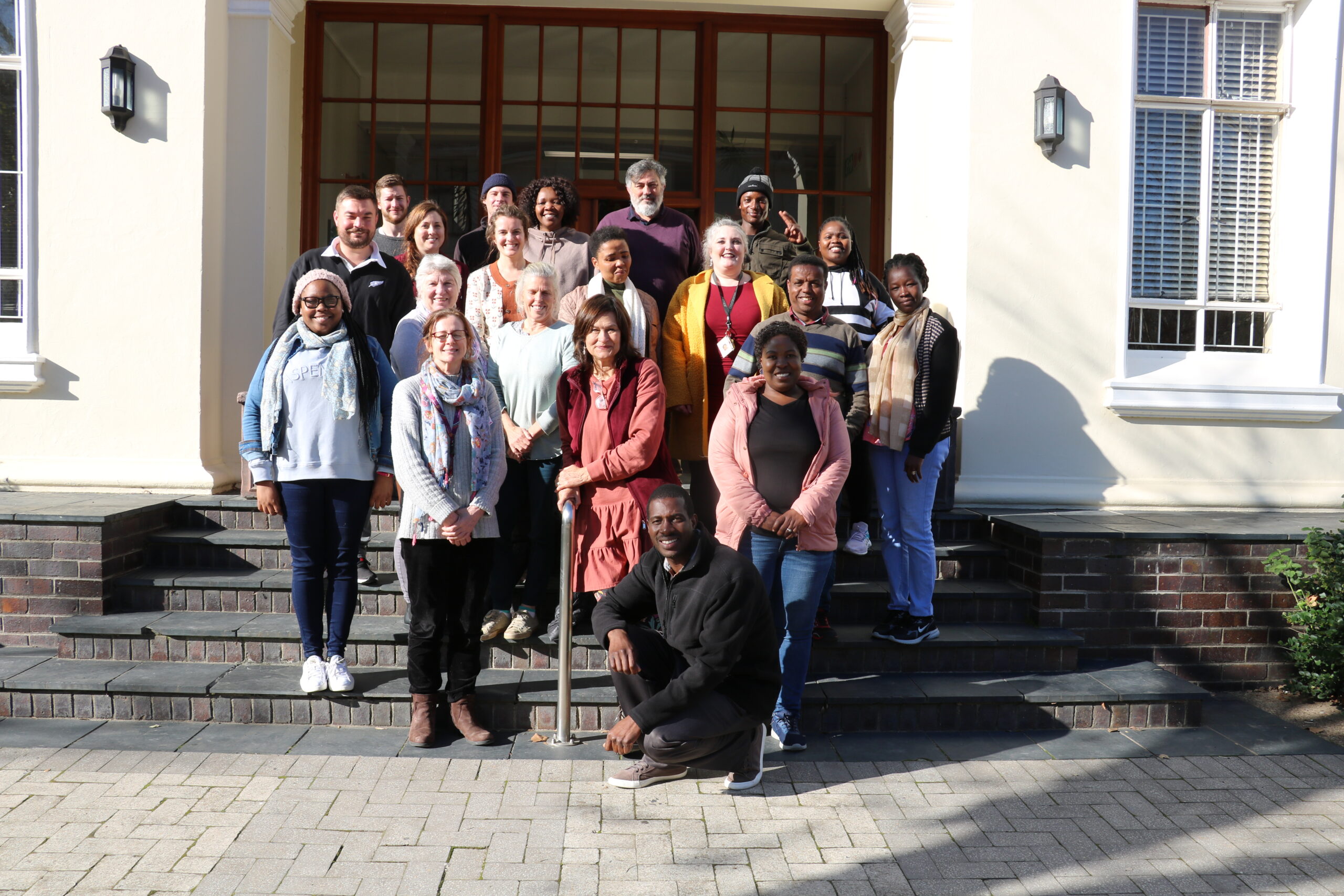
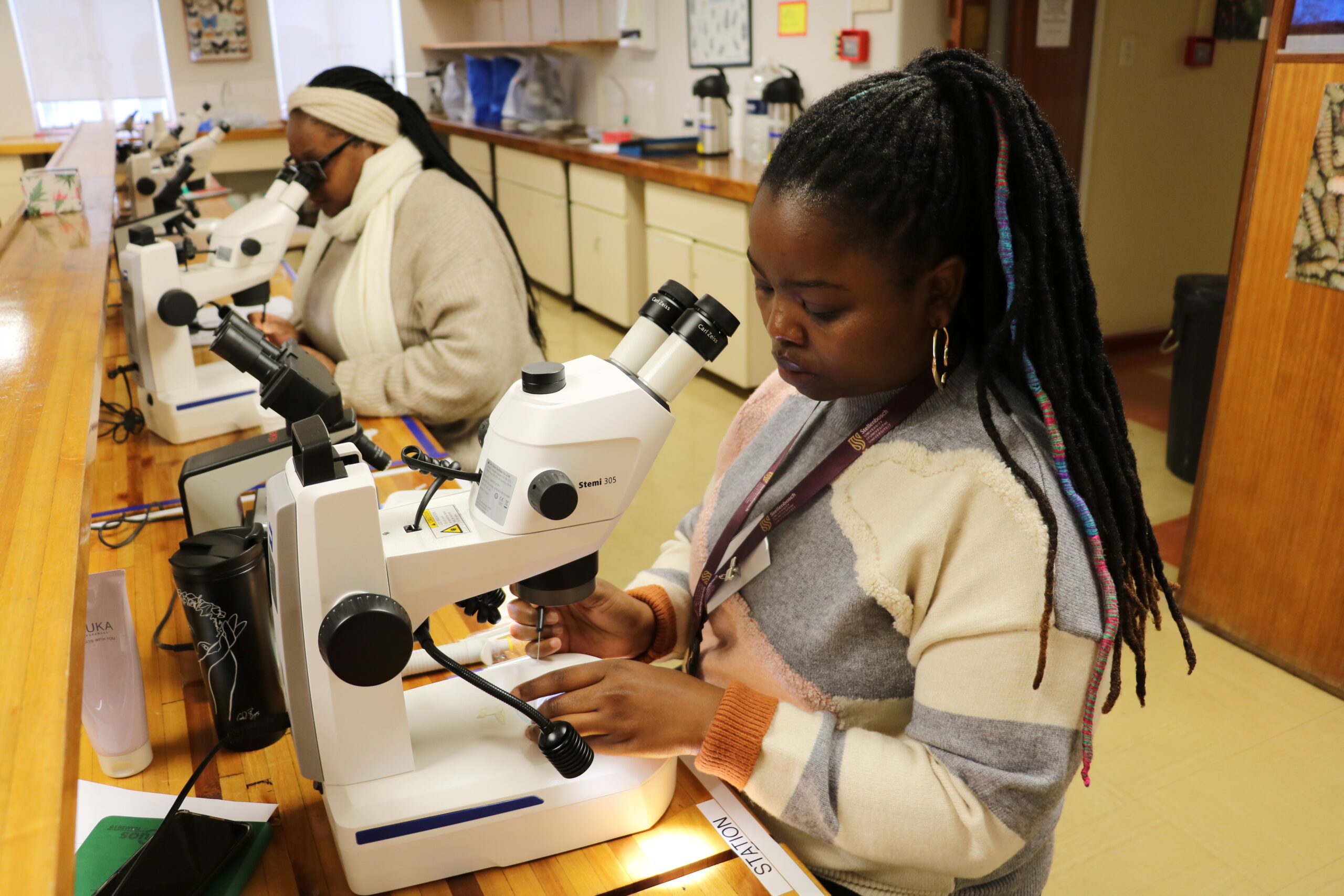
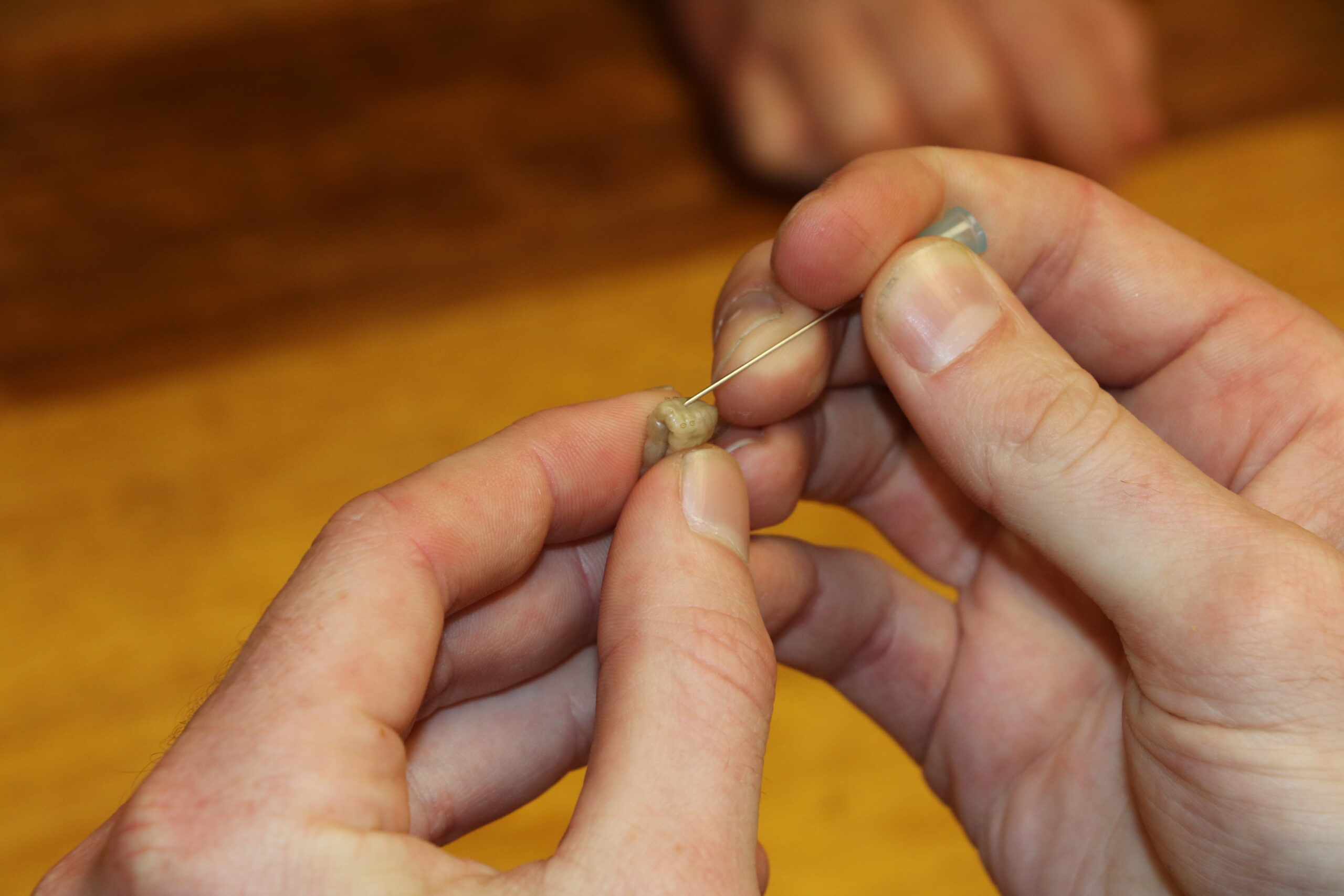
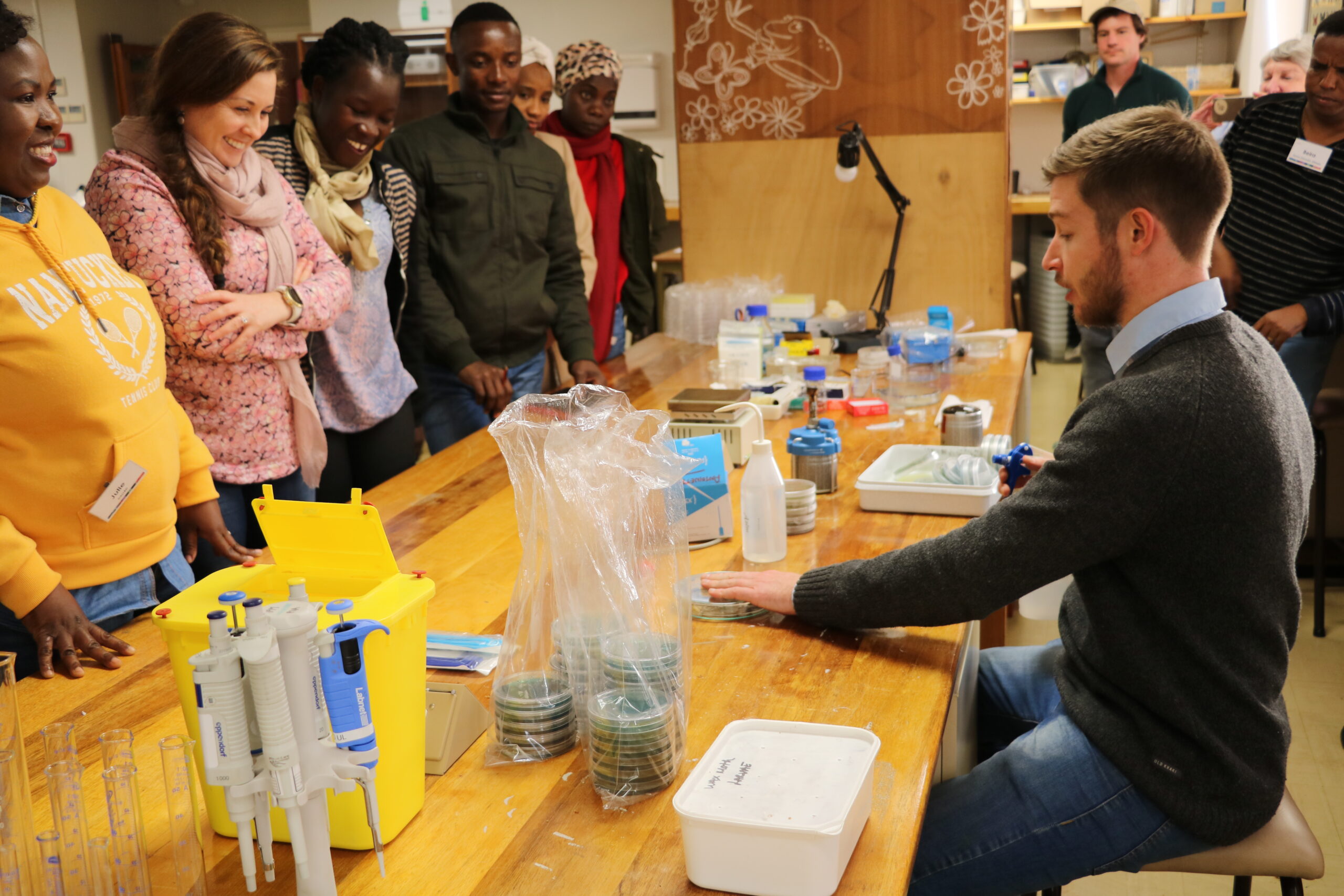
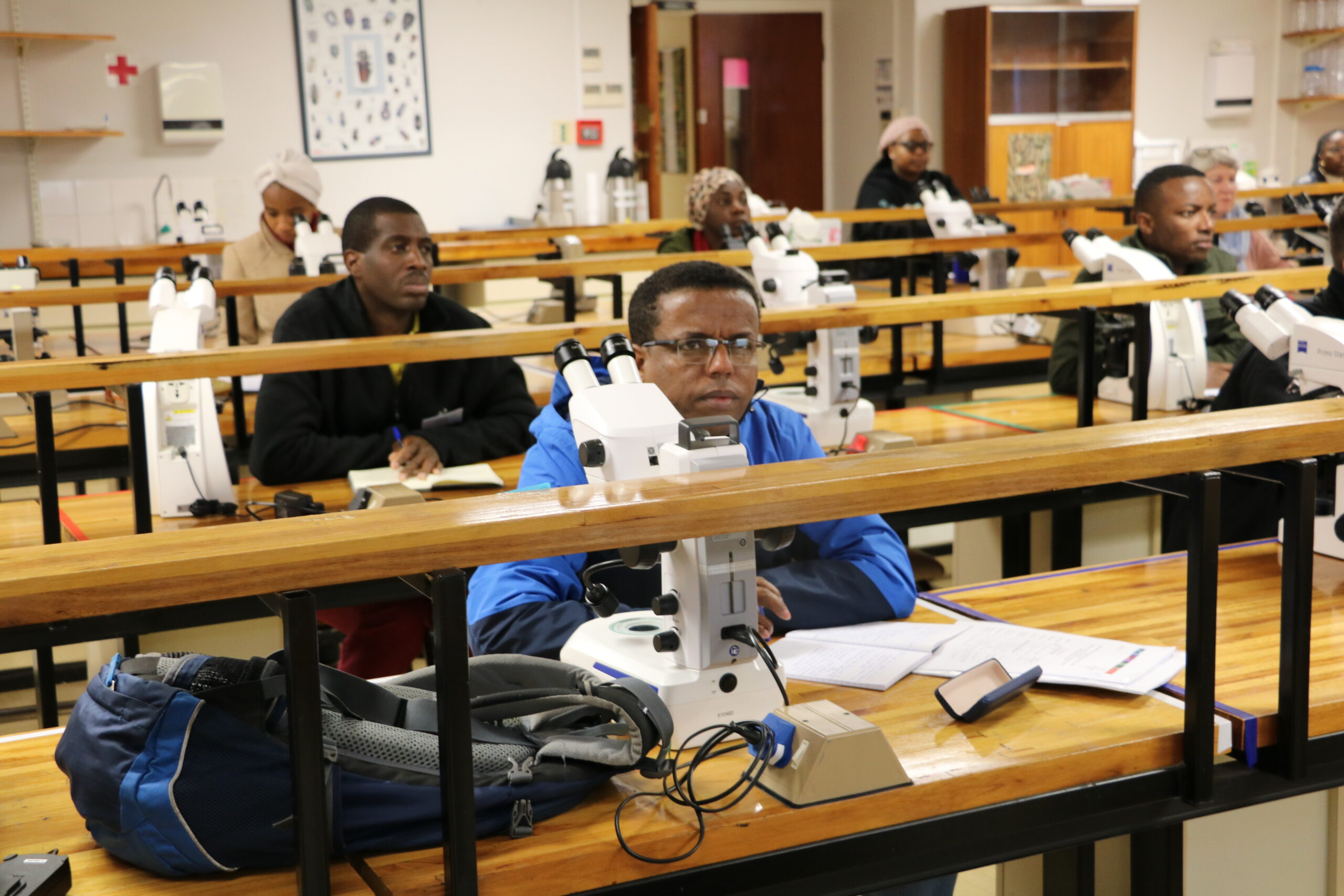
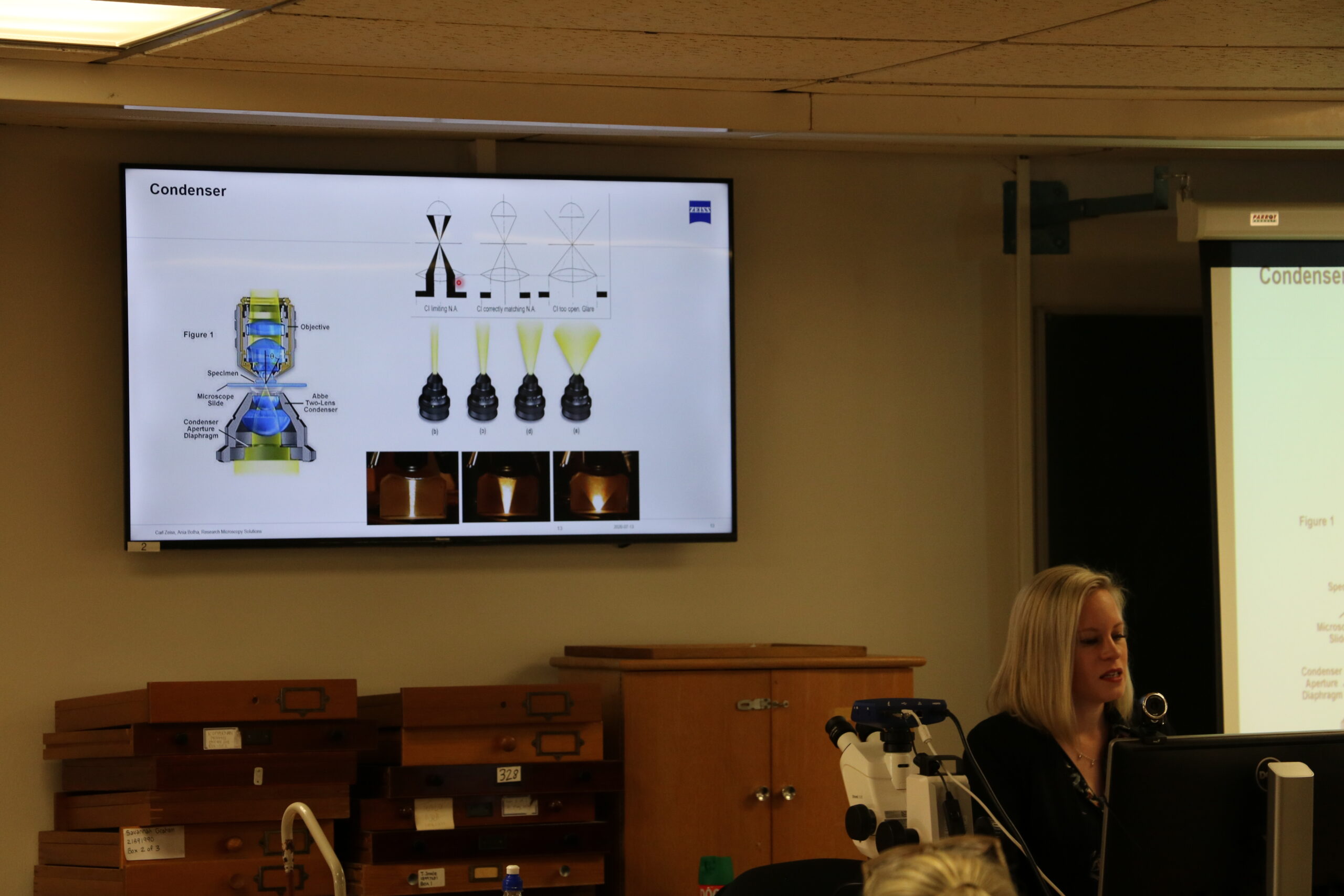
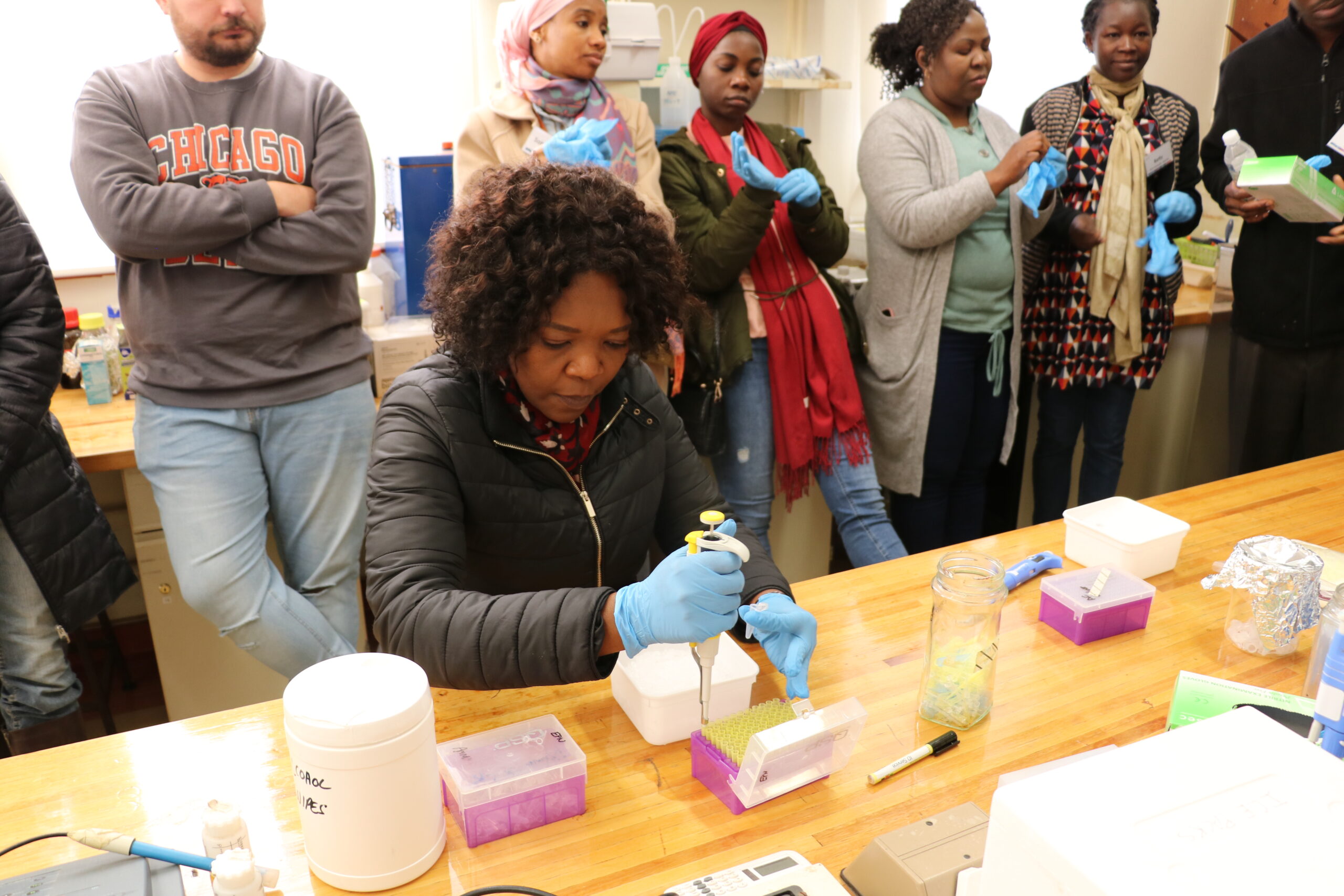
Visit our website www.sanematodes.com or contact our Symposium chair: Prof Driekie Fourie (driekie.fourie@nwu.ac.za ) or Secretary/Treasurer Annika Pienaar ( sanematodes@gmail.com).
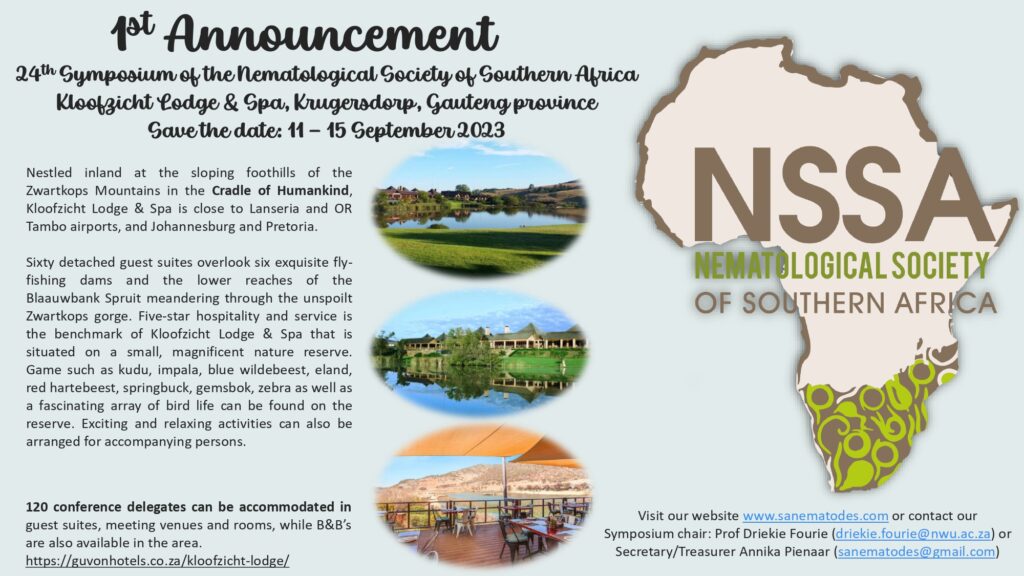
PANEMA (the Pan-African Nematology Network), is proud to present our series of webinars on topics related to Nematology in Africa. You are invited to join us for the second PANEMA webinar on Friday 5 August 2022 at 12:00 CEST/ SAST, or 11:00 WAT.
Topic:
- “Wrap and Plant” technology: An innovative method for managing plant-parasitic nematodes on yam (Dioscorea spp.)
- La technologie “Envelopper et Planter”: Une méthode innovante pour la gestion des nématodes parasites de l’igname (Dioscorea spp.)
NEMEDUSSA partners Antoine Affokpon and Elodie Coffi (Université D’Abomey-Calavi, Benin) will share their expertise simultaneously in French and English, after which a stimulating discussion will follow.
Please register at: https://zoom.us/meeting/register/tJcod-CvrDIjGdcNZ3pifZHuPqap0cRyngr1. Upon registration, the link for the ZOOM meeting will automatically be sent to you.
We look forward to seeing you there!
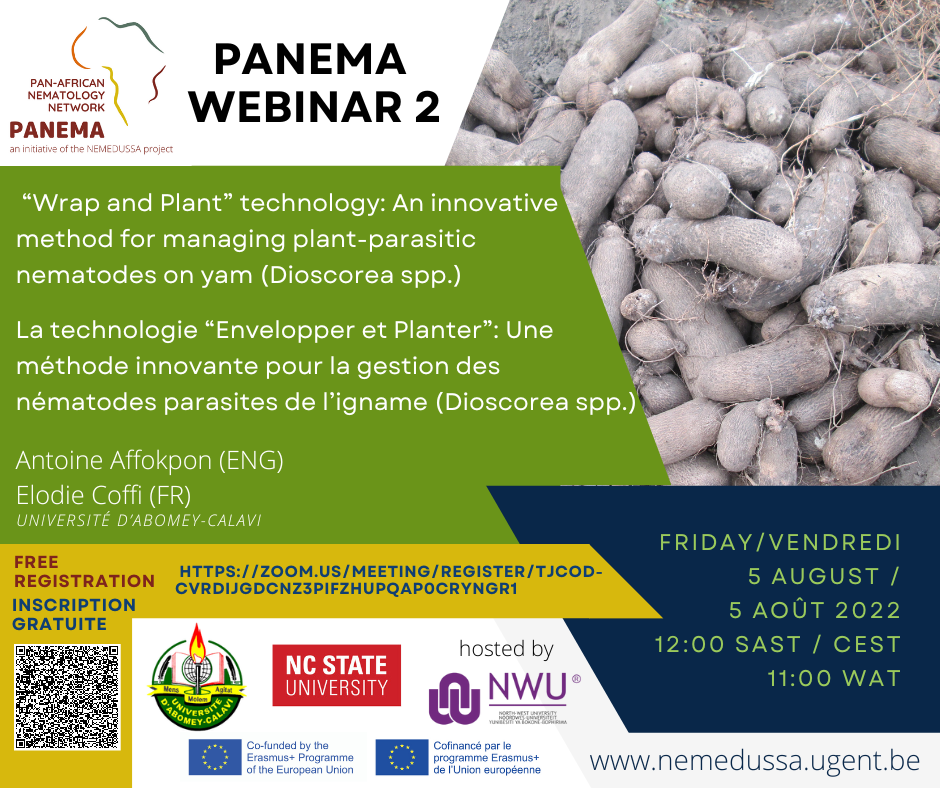
In June 2022, the University of Abomey-Calavi (UAC), Benin successfully established their Nematology Student Club. The club is based at the School of Plant Sciences (ESTPV), and will build on the work of the NEMEDUSSA project.
The UAC Coordinator of the Project, Dr. Antoine Affokpon, welcomed everyone to the launch of the club. After a brief presentation of the NEMEDUSSA project, he highlighted the benefits for UAC such as providing equipment for practices to students, capacity building of Staff (e;g. trainings of Mr Christian Atchadé on EPN at SU, of Ms Elodie Coffi on PPN at UGent, and coming trainings of Ms Coffi on SBI at UGent and Sabrina Adanmaho at BCCN in Nairobi), developing Nematology Course Content for BSc, MSc and Agronomic Engineer levels, etc.). He also pointed out that UAC should, on its side, contribute to awareness on nematodes issues (e.g. PPN) and benefits (e.g. EPN) among its academics, scientists, University students/Secondary schools/High schools/youth, Private sector, Government organizations (GO’s) and Non-governmental organizations (NGOs), Policy makers, Extension service workers, and Farmers and farmer’s associations. UAC, through the Faculty of Agronomic Sciences, has also to implement the Nematology Course to be developed by the Consortium for 12 Sub-Saharan Universities members of the Consortium.
This presentation was followed by a discussion of the aims and activities of the student club. The Student club members were invited to consider themselves spokespersons of Nematology towards their peers in other Universities and the students of Secondary and High Schools of Agriculture. Other participants expressed the wish that similar activities will be conducted soon with farm cooperators and NGO’s investing in Agriculture.
The meeting was attended by 24 participants including the Vice-Dean of the School of Plant Sciences, 16 students of UAC, online participation of 1 student of UGent (belonging to Nematology Unit of UAC), 2 participants from the External Collaborator Cooperative Eco-Legumes, 3 staff of Nematology Unit and the accountant of the Project. All the 16 pre-selected students agreed to be members of Nematology Student Club of UAC. They were then divided into 4 thematic groups: Plant-Parasitic group (PPN), Entomo-pathogenic group (EPN), Nematode as bioindicator group (NBI) and Nematode as model organism group (NMO). A coach was assigned to each thematic group. The Club will start its work in July and will be officially inaugurated at the start of the next academic year in September.
The Vice-Dean of the School, Prof. Aimé Bokonon-Ganta, in his closing remarks congratulated the participants for the quality of the discussion and declared that the success of the Nematology Student Club will encourage the establishment of similar club in other disciplines.
For more information about the Student Club contact:
Nematology Unit (UNema), Faculty of Agronomic Sciences (FSA), University of Abomey-Calavi (UAC), Tel: (229) 97 12 44 08; E-mail: affokpona@gmail.com

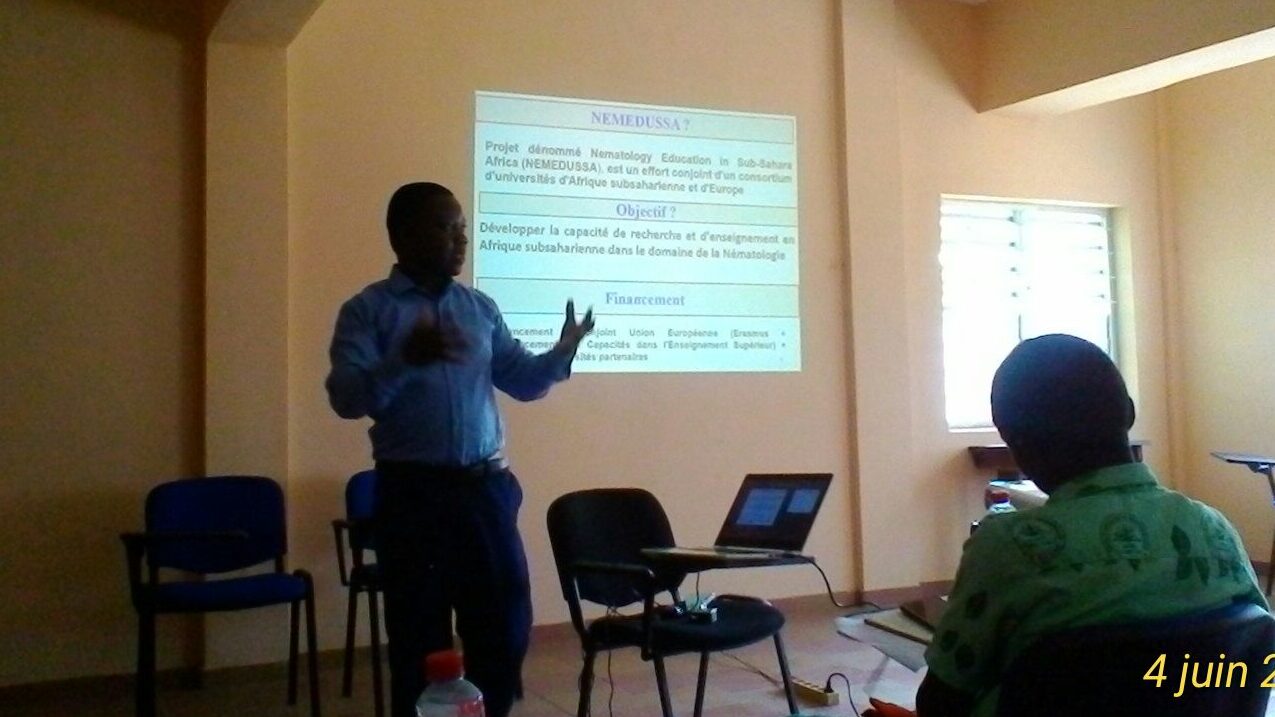
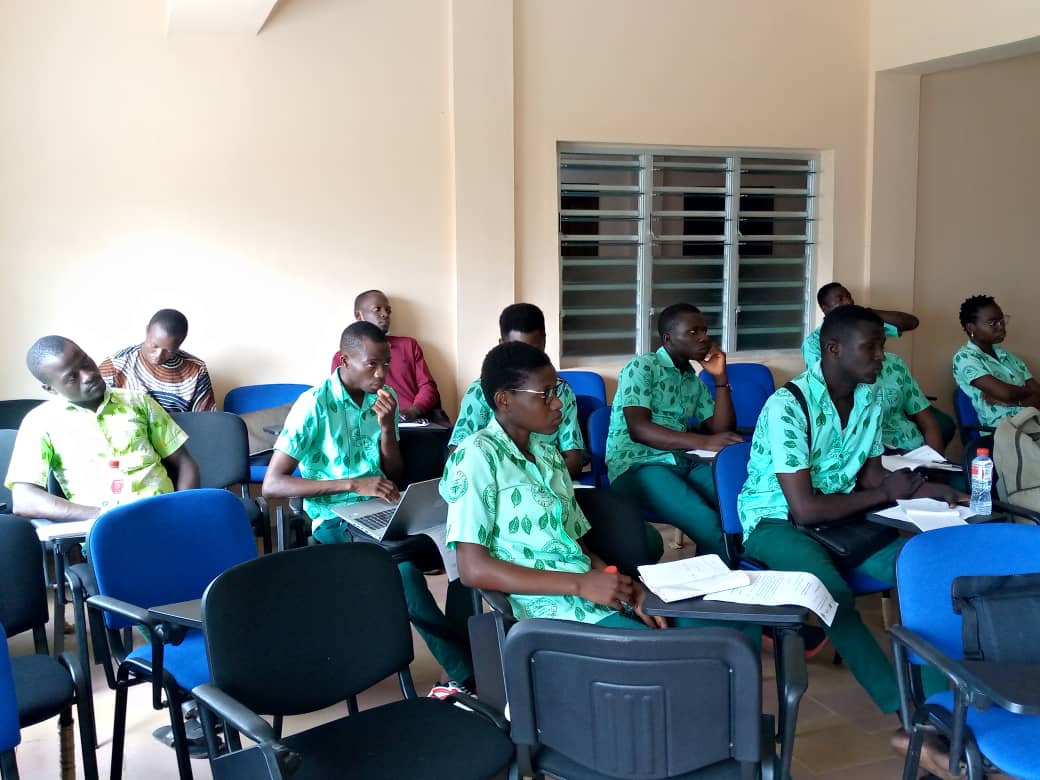
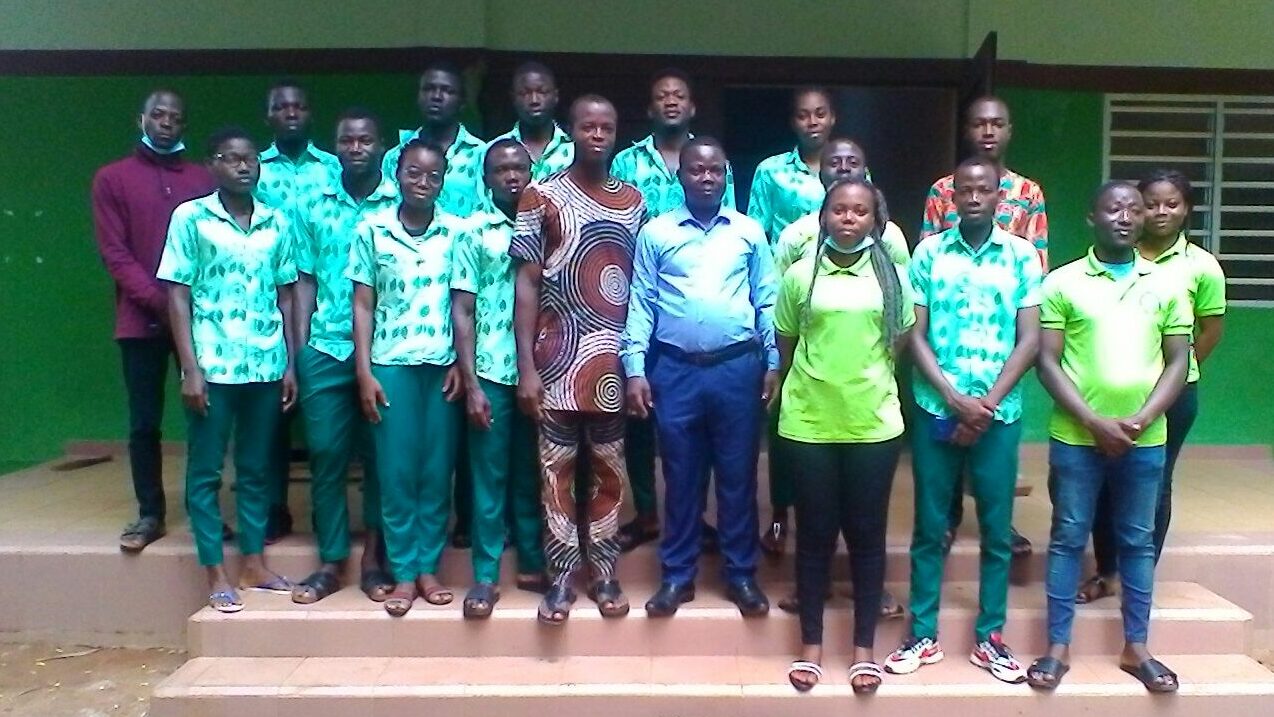
Images
From 6-9 November 2023, the NEMEDUSSA student club from Ahmadu Bello University (ABU) visited 4 schools in Zaria, Nigeria to talk to learners about nematodes. The initiative was led by Dr. Julius Bulus from the Department of Crop Protection at ABU, who inspired and empowered the student club members to participate in this initiative. The student club members are current students of the Faculty of Agriculture at ABU. Not only did the student club members design the dissemination material, but they also presented to the schools. The visits were very well received, as many learners had never heard of nematodes before. Dr. Bulus mentioned that they had received requests from numerous schools in the area to engage with the learners and continue the visits, as there is a real need for this kind of educational initiative.
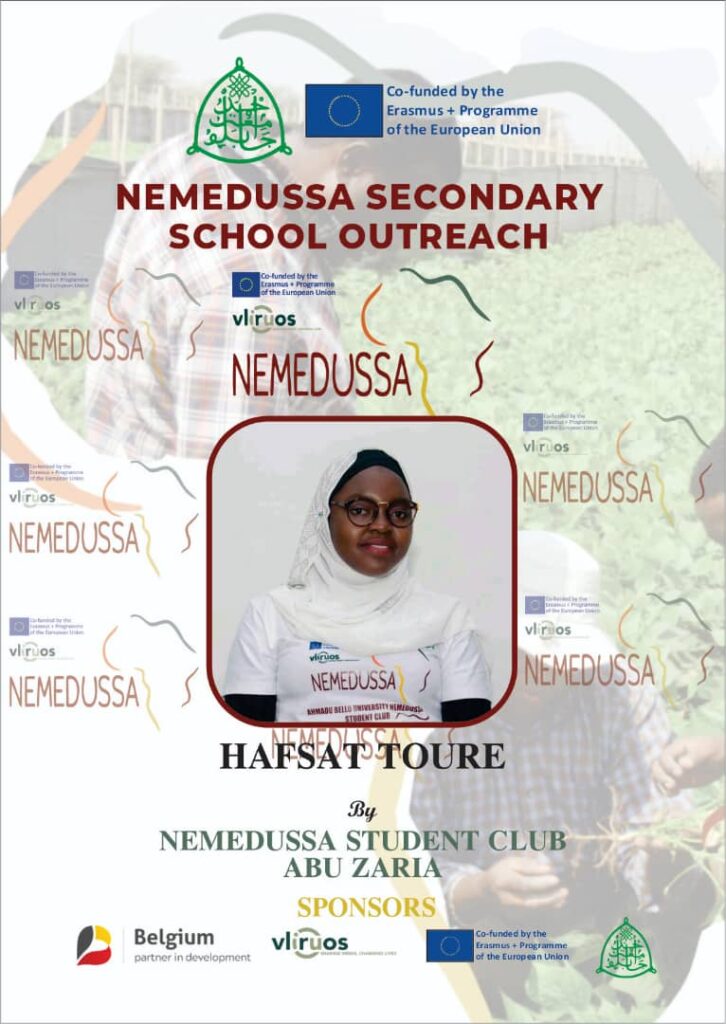
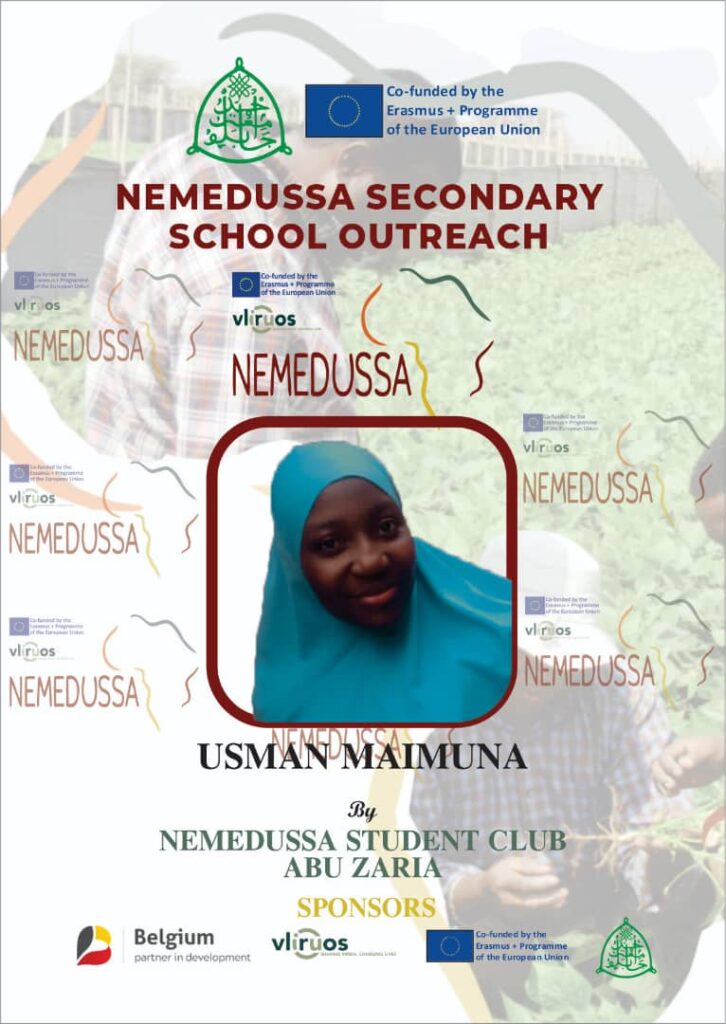
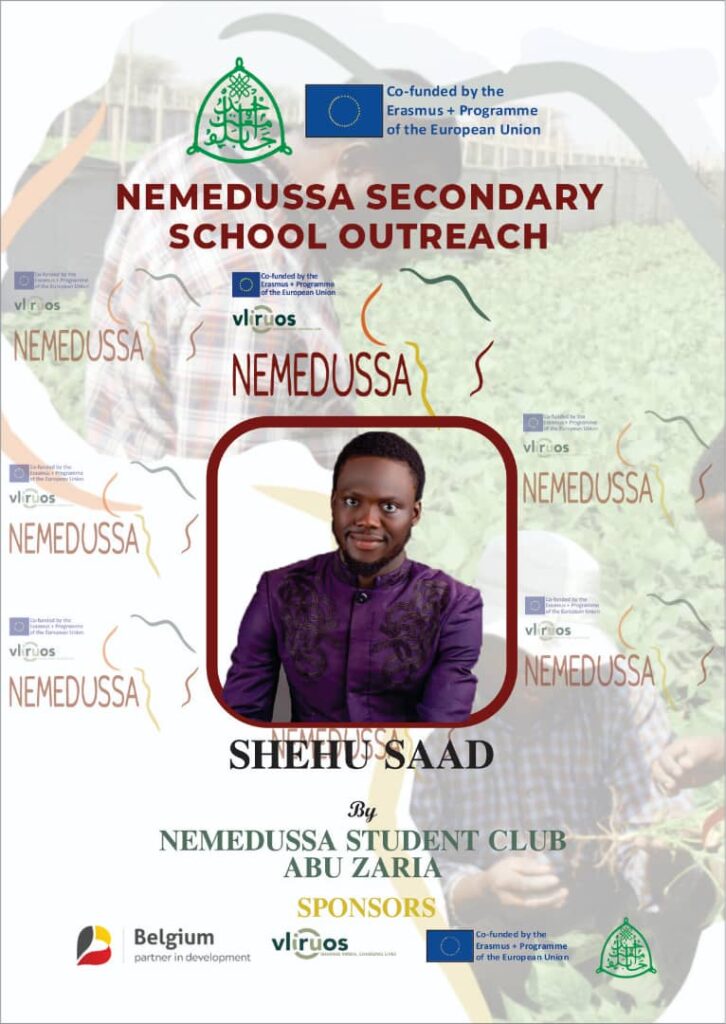
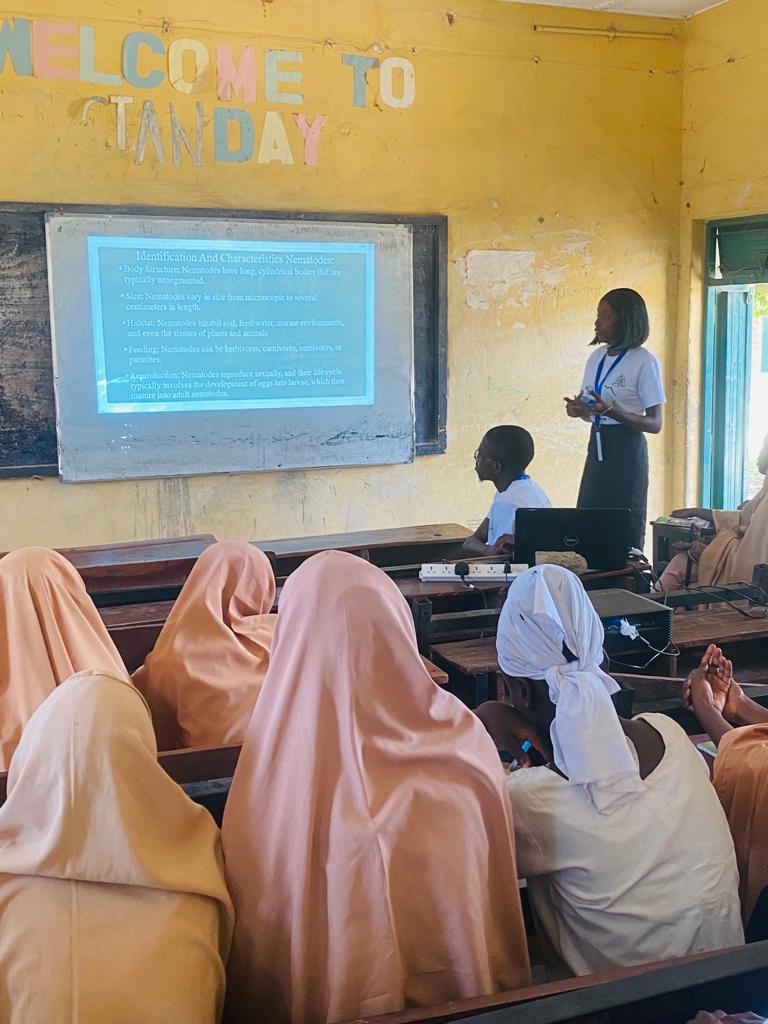
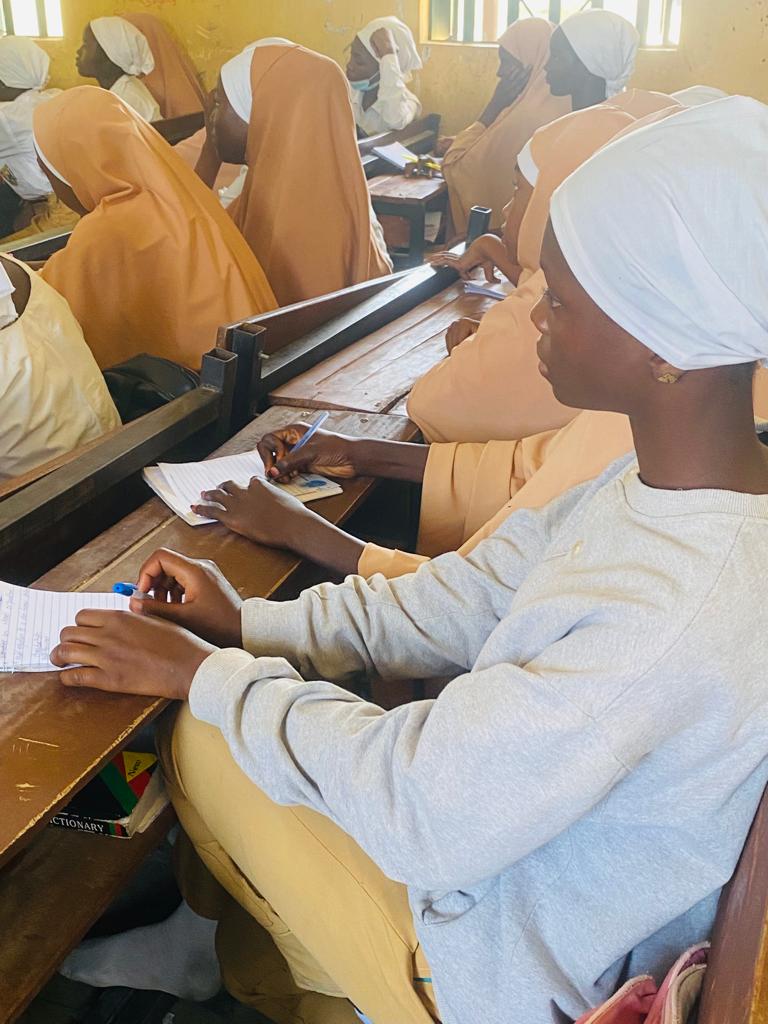
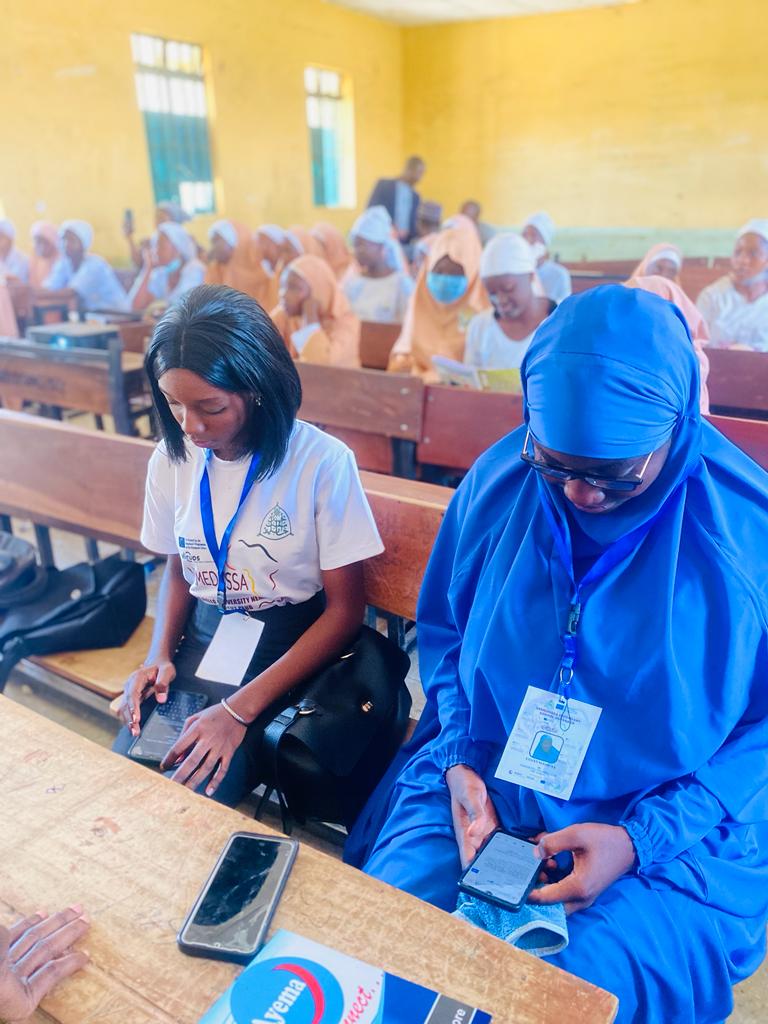
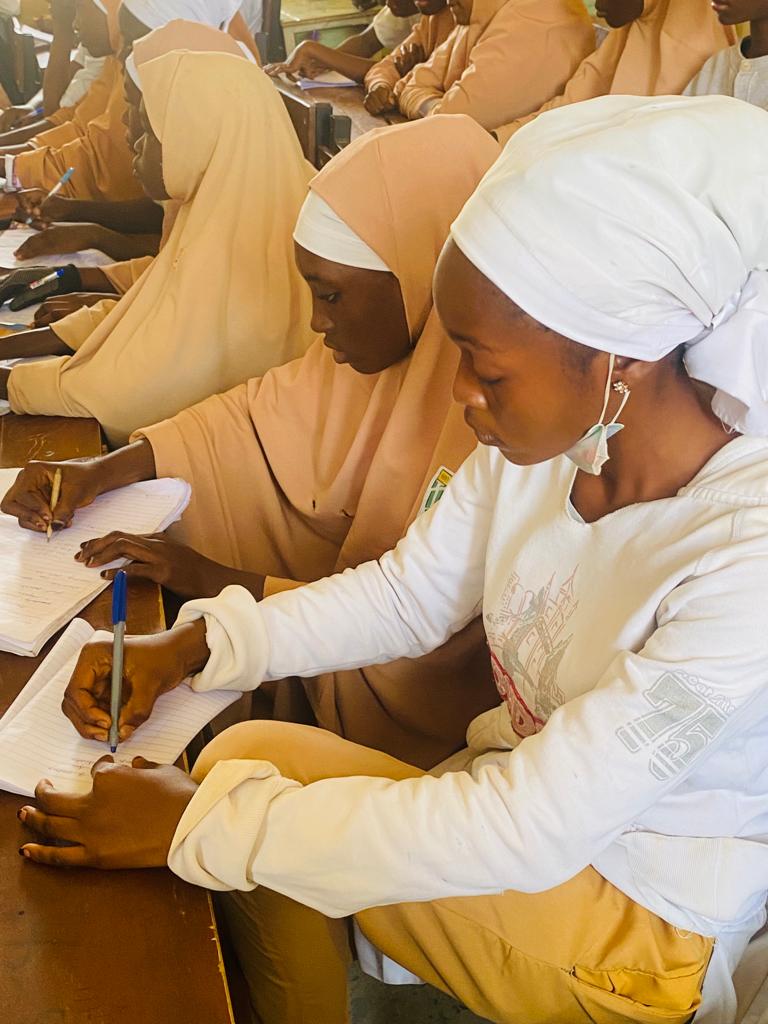
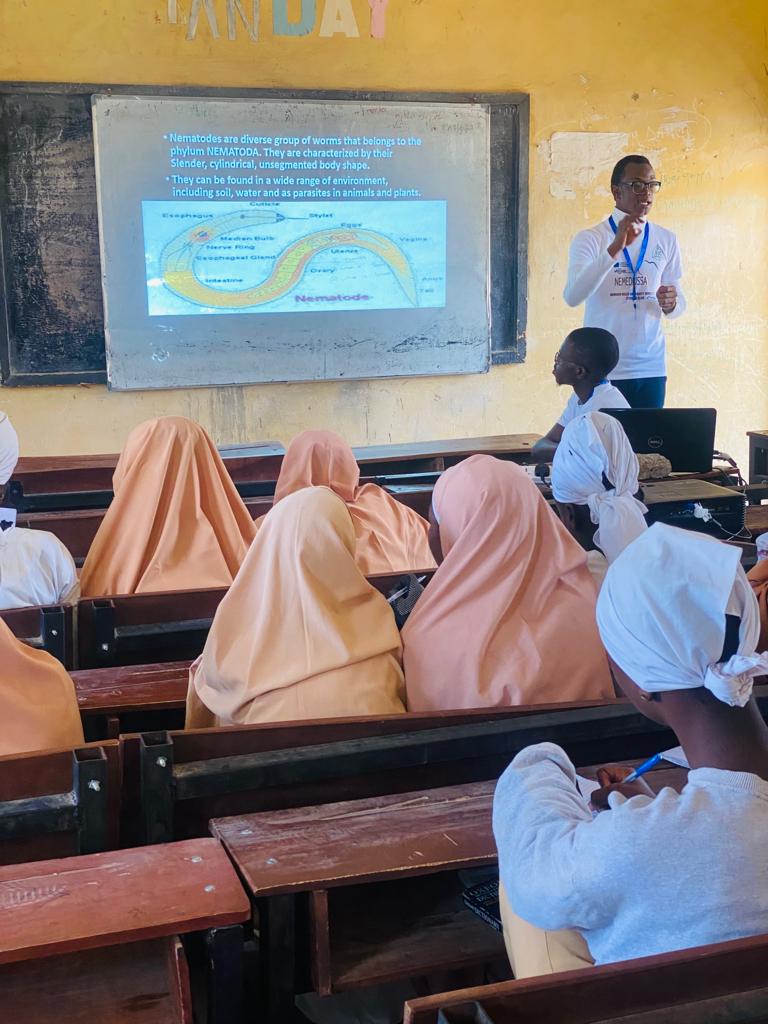
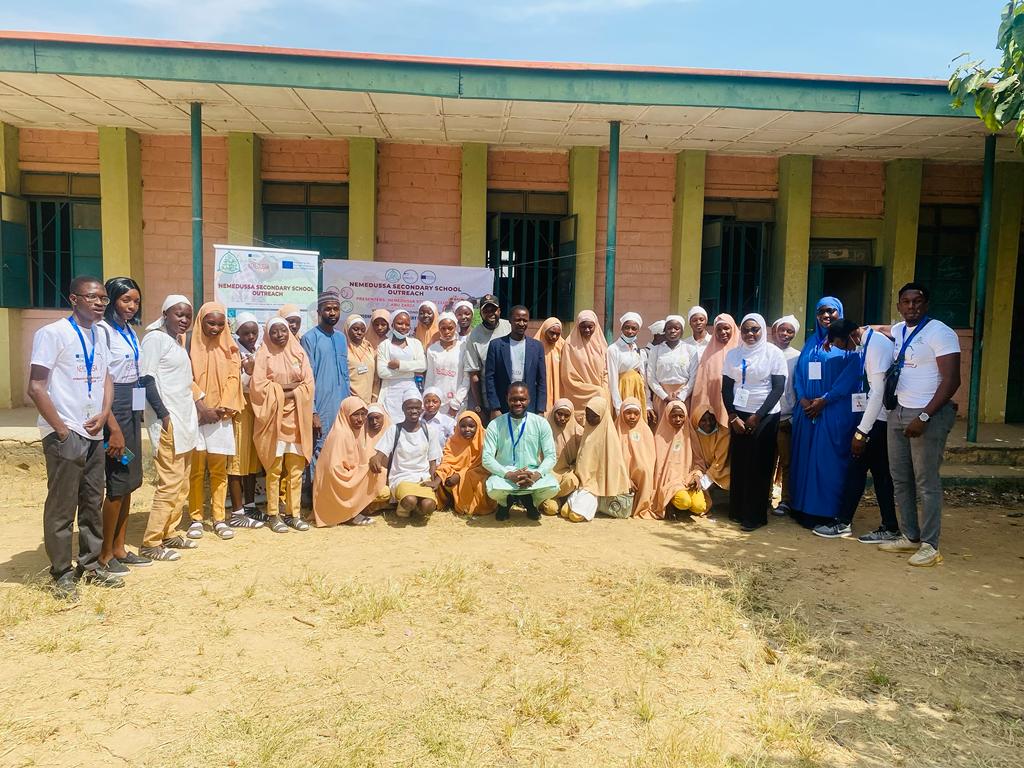
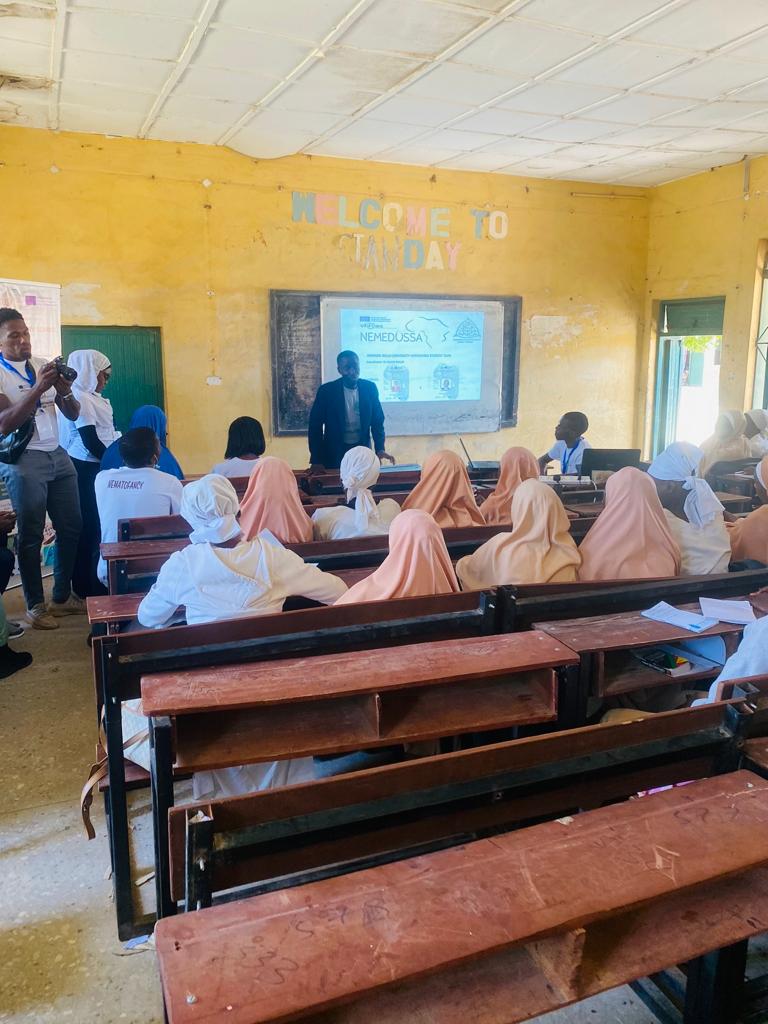
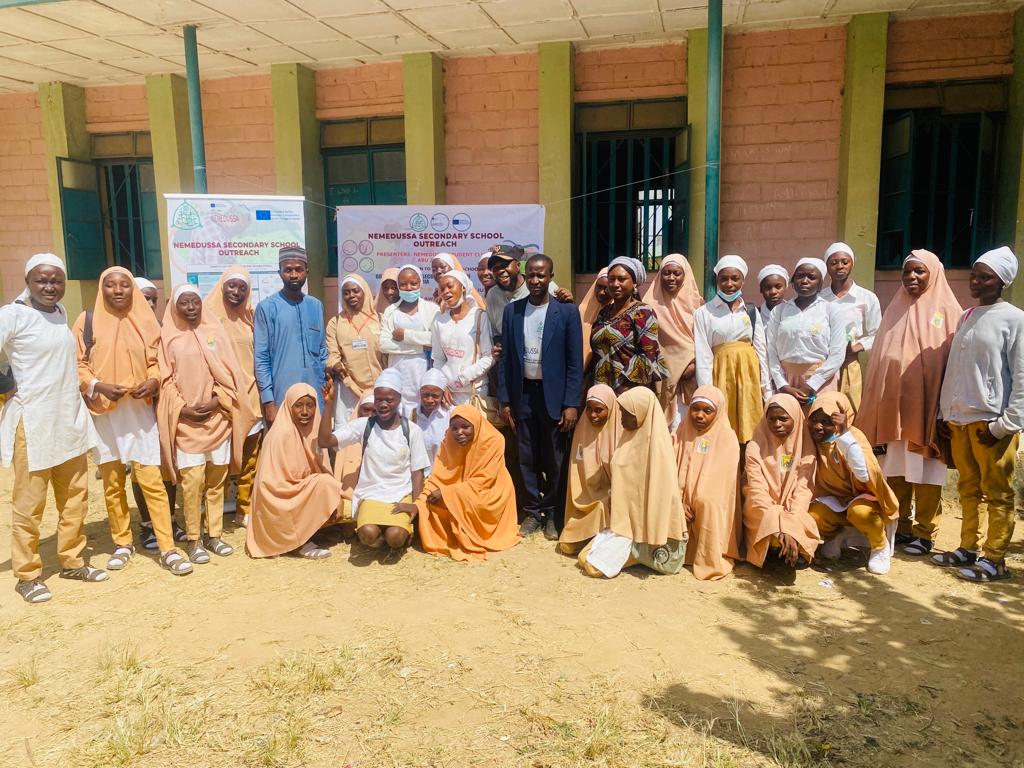
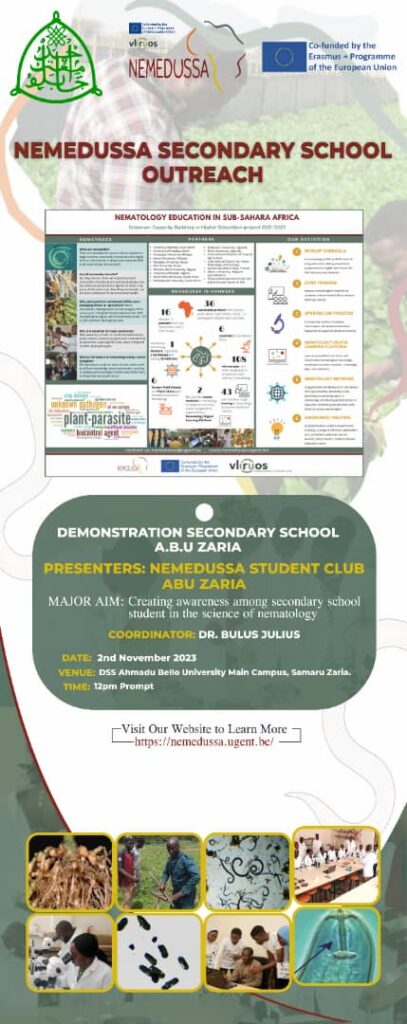
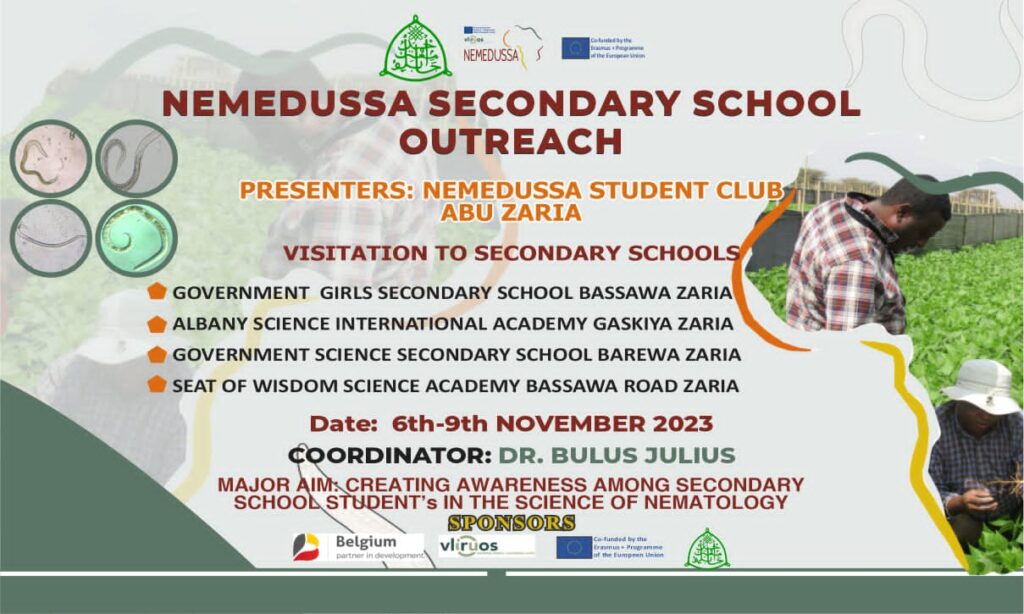
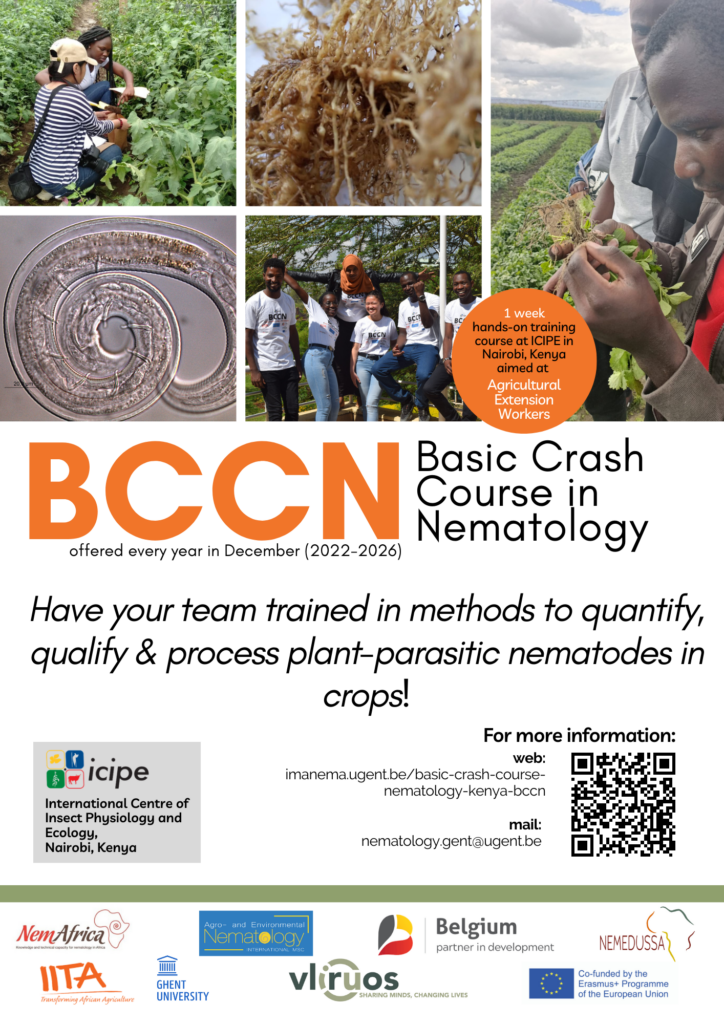
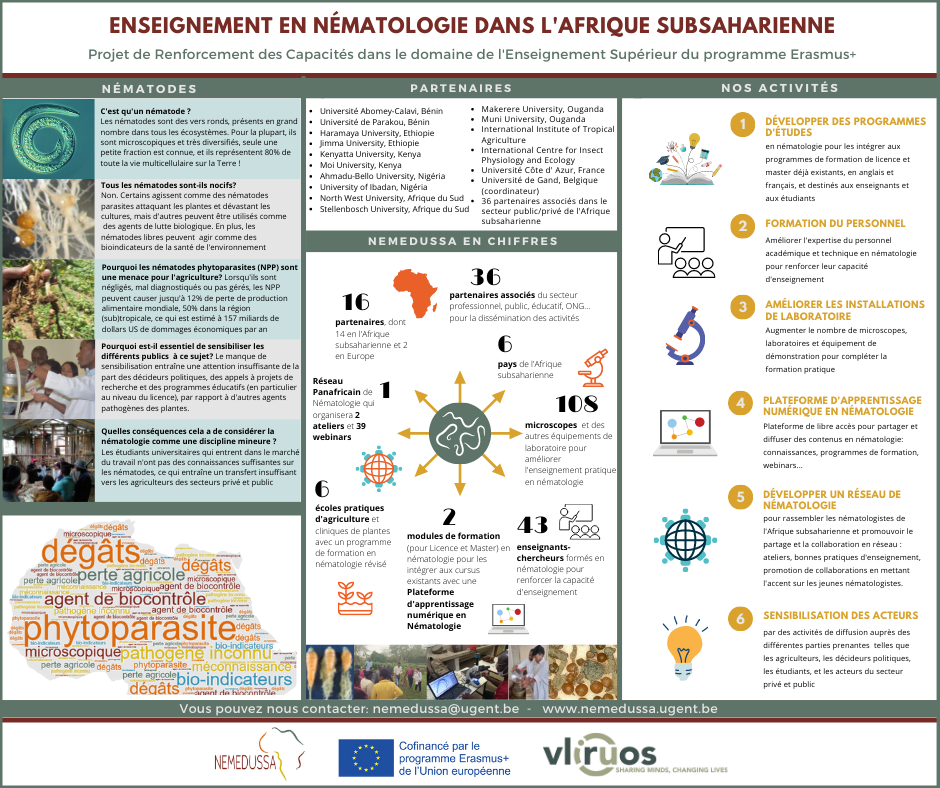
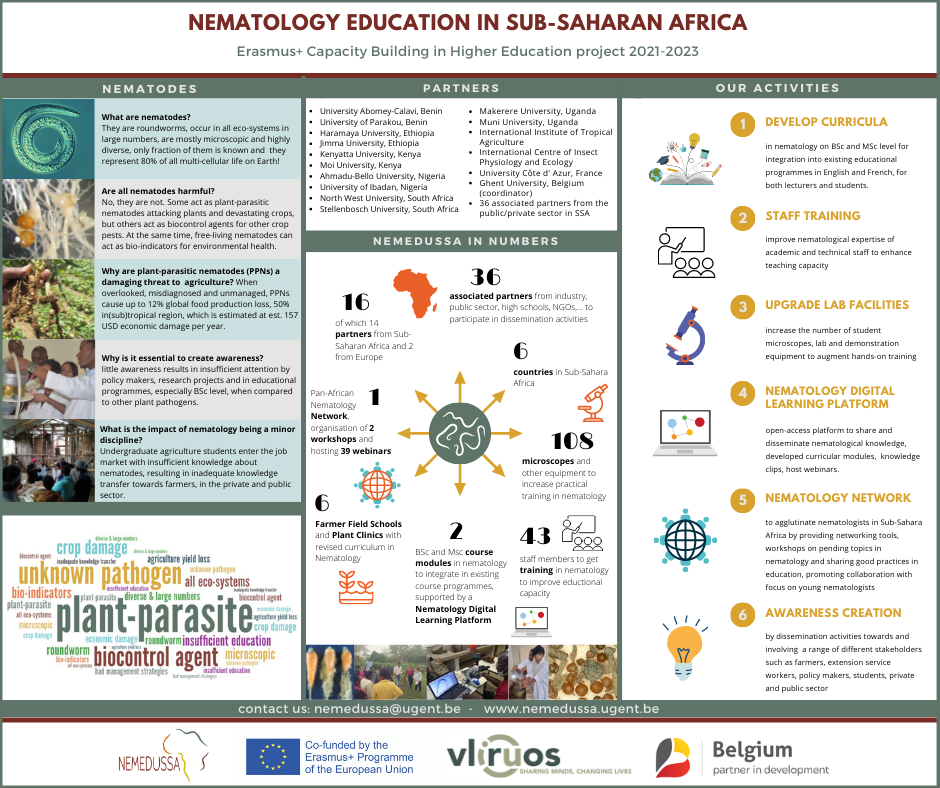
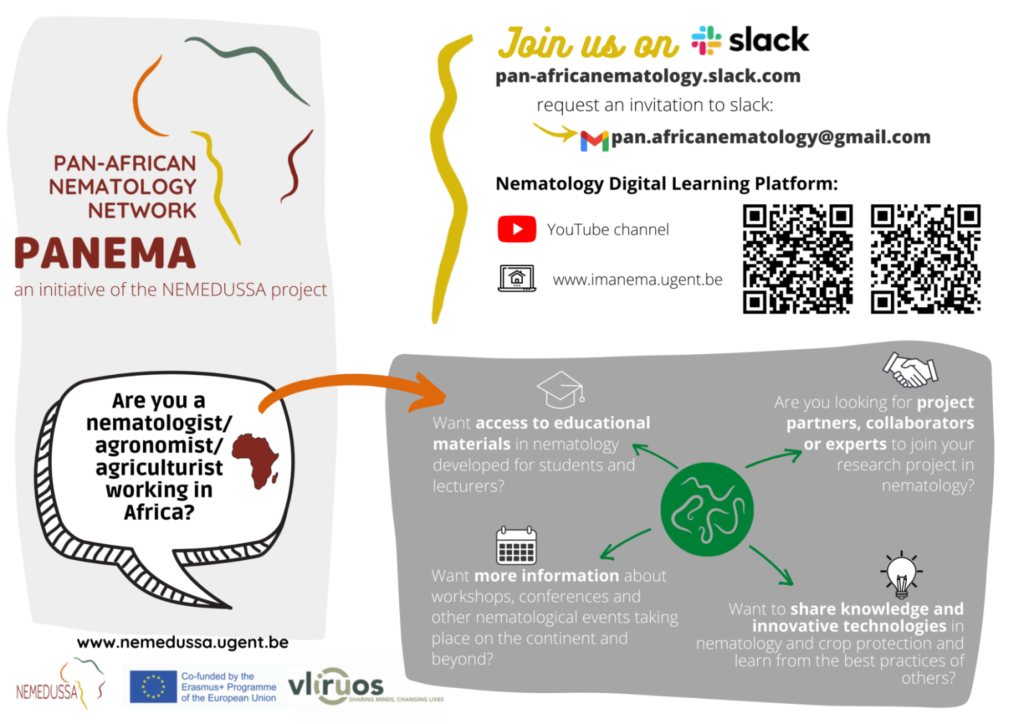
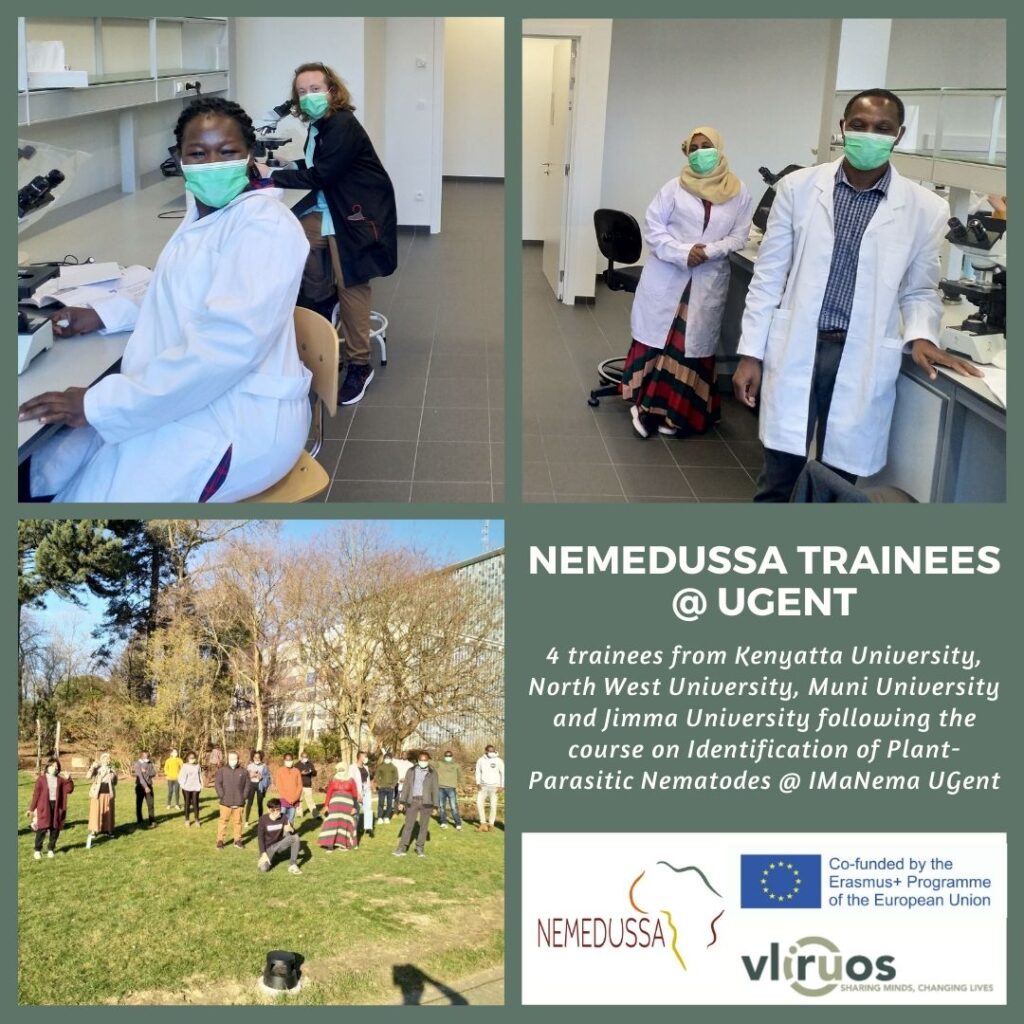
Publications and reports (pdf)
Nematology Colouring books available for download
The Nematology colouring book, ‘From A to Z, nematodes colour our lives’ is now available for free download, although the material remains copyrighted to the publisher. The book is formatted for printing, size 21.5 x 21.5cm.
The book is available in the following languages: Afan Oromo (Ethiopia), Afrikaans (South Africa), Amharic (Ethiopia), Baatonum (Benin), English, Fon (Benin), French, Hausa (Nigeria), Swahili (East Africa), Yoruba (Nigeria) and Xhosa (South Africa).
Growing Nematology in Kenya
There is an increased media interest in Nematology and nematodes in Kenya, thanks to the activities of NEMEDUSSA partner Moi University. At the Eldoret Agricultural Show held earlier this year, learners were guided by Nematology students from Moi University in looking through a microscope as an introduction to these microscopic animals. This was captured in the newspaper, the Sunday Nation. A interview with Nematologist and NEMEDUSSA project leader at Moi University, Dr. Njira Njira Pili, was also recently published in the Saturday Nation. To read the interview with Dr. Pili, download the article below.